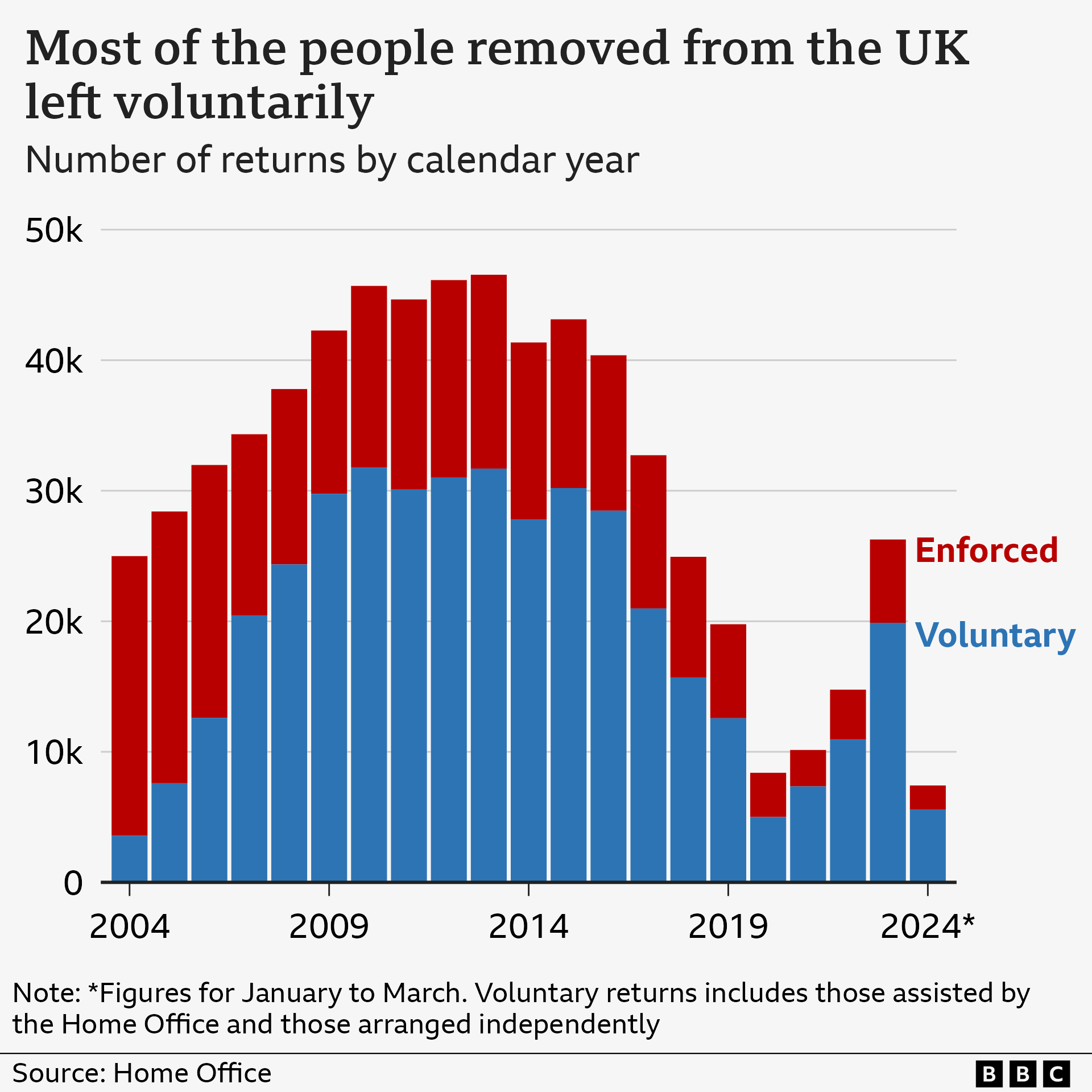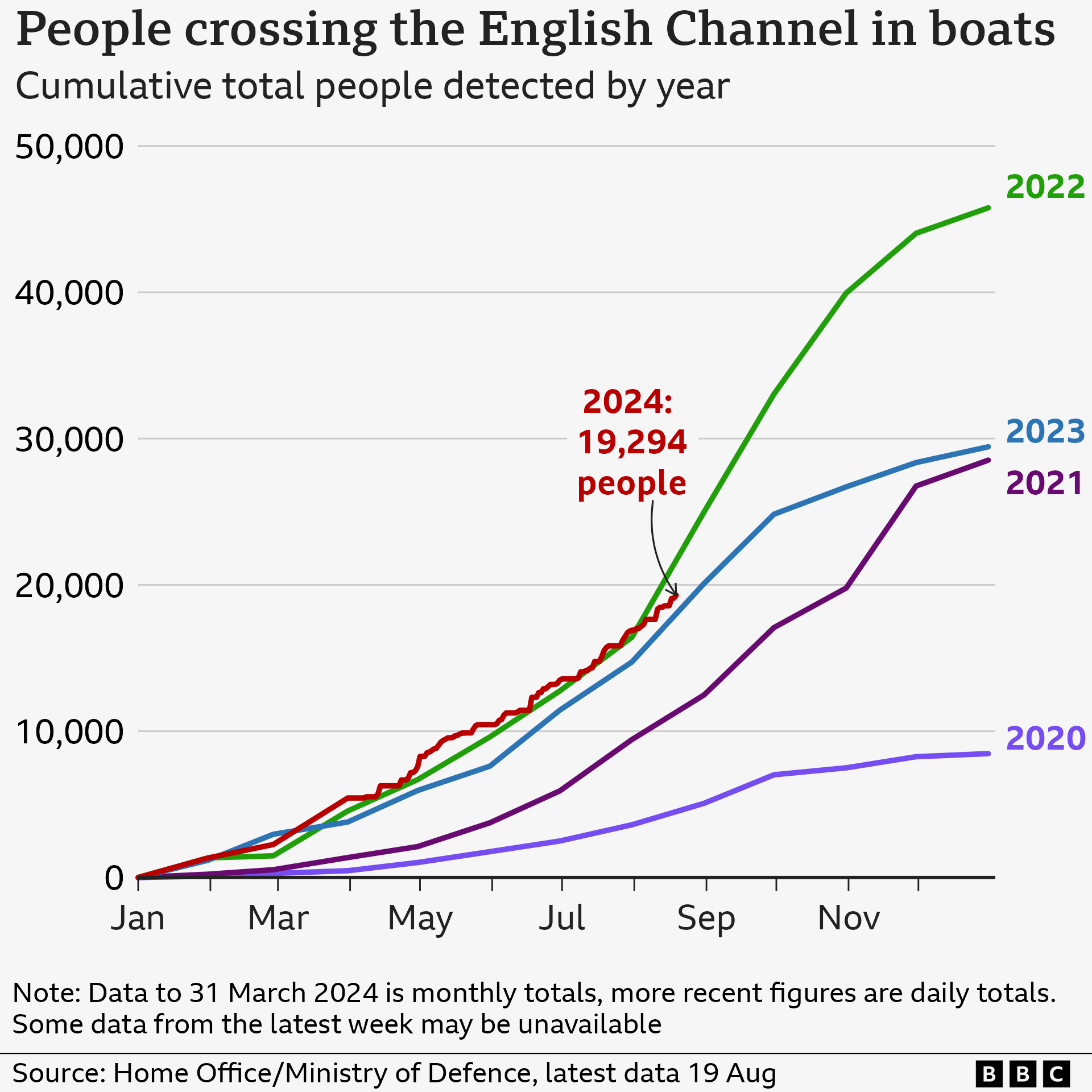Ministers pledge to return more illegal migrants

- Published
Home Office ministers have promised a "large surge" in returns flights for failed asylum seekers and others with no right to be in the UK.
Plans include 100 more new intelligence officers to target people smuggling gangs and reopening immigration removal centres in Hampshire and Oxfordshire, adding 290 beds.
Home Secretary Yvette Cooper said she wanted to introduce a "better-controlled" system to replace "the chaos that has blighted the system for far too long".
The Conservatives said Labour were "not serious about tackling the people smugglers or stopping the boats".
Starmer confirms Rwanda deportation plan 'dead'
- Published6 July 2024
Cooper sets out plan to tackle small boat crossings
- Published7 July 2024
Shadow home secretary James Cleverly welcomed more resources for the National Crime Agency and increased detention capacity but said the government's plan was "not ambitious enough".
"Paired with their moves to cancel our [Rwanda scheme] deterrent, give an effective amnesty to thousands of illegal migrants, and failure to hire a head of their phantom border command, it doesn't scratch the surface," he said.
Home Office Minister Seema Malhotra said nine "return" flights had taken off over the last six weeks since Labour won the election, including one carrying more than 200 people.
Recruitment for a new UK Border Security Command chief was announced in early July with an appointment expected within weeks, but the new command leader has not yet been named.
Over the next six months, Labour aims to achieve "the highest rate of removals of those with no right to be here" since Theresa May's premiership in 2018.
There would need to be 3,000 more removals this year than last year in order to reach the 2018 levels of 9,000 enforced removals, Dr Peter Walsh, a senior researcher at the Migration Observatory, told BBC Radio 4's Today programme.
Dr Walsh said this "looks like an achievable goal but it’s a pretty low bar", as 2018 saw the lowest number of enforced removals in 20 years, other than during the pandemic.
He added there were more voluntary removals than enforced exits in 2018 and suggested legal challenges, budget cuts and a lack of returns agreements could be behind that.

Enver Solomon, chief executive of the Refugee Council charity, urged the government to support failed asylum seekers to return voluntarily rather than expanding detention programmes, saying two-thirds of failed asylum seekers already leave voluntarily.
He told the BBC: "Instead of wasting taxpayers’ money on expanding detention places the government should be investing in what are called voluntary returns programs.
"If you treat people with respect and humanity and support them to return, many more people return."
More than 19,000 people have crossed the Channel in small boats so far this year - a 10% increase on last year but a fall from the peak of more than 21,000 in the same period in 2022.
The previous Conservative government tried to reduce numbers through its Rwanda scheme, which aimed to deter people from crossing the Channel by deporting some migrants to the east African country.
However, no flights took off under the scheme before the election and Labour immediately scrapped the plan when it won power, labelling it a "gimmick".
Instead Sir Keir Starmer has pledged to focus on stopping the criminal gangs that arrange for people to make the crossings and speeding up the process of returning those with no legal right to be in the UK.

The government has now announced that 100 new specialist intelligence officers and investigators will be deployed to the National Crime Agency (NCA) to "disrupt and smash criminal smuggling gangs and prevent dangerous boat crossings".
The NCA currently has around 70 active investigations into people smuggling and trafficking groups and new staff will be targeting the supply of inflatable boats and equipment.
The government also says it will redeploy staff to work on returning failed asylum seekers and increase sanctions against employers who hire workers illegally.
Other measures announced by the government include increasing capacity at detention centres, by reopening the Campsfield and Haslar sites in Oxfordshire and Hampshire.
Haslar, near Portsmouth, was closed in 2015 after a report described it as "expensive and damaging to detainees".